Faith Matters: May we be inscribed and sealed in the Book of Life: Understanding Rosh Hashanah and Yom Kippur, the time when we are the closest to G-d
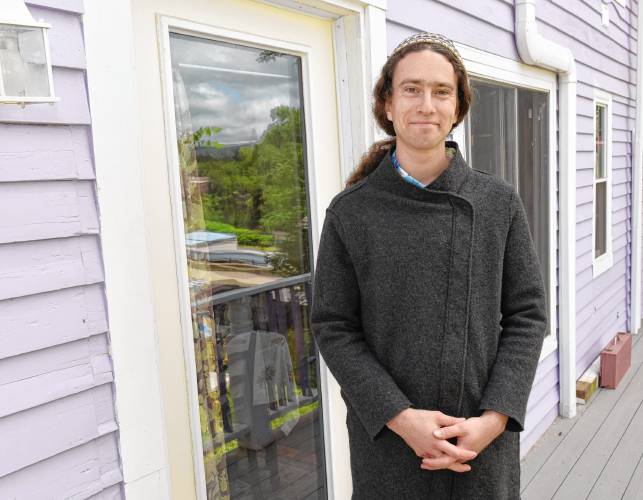
Jasper Lapienski outside his Greenfield home. STAFF PHOTO / PAUL FRANZ
| Published: 08-25-2023 12:02 PM |
Pushing. Squeezing. Sweating. Fighting for position, I tensed every muscle in my torso to give myself enough room to breathe. What was I thinking?!
Eleven months ago today, I found myself in the basement of a famous synagogue in Brooklyn on the first night of Rosh Hashanah. The all-male crowd was beyond shoulder-to-shoulder or even stomach-to-stomach; our bodies seemed to overlap and the building seemed to expand as each new thousand forced its way onto the floor. I was the only one who wasn’t wearing a suit.
As a wave of movement swept back through the room, I felt panic as the people in front of me started to lose their balance. The laces of my right shoe came undone and were permanently trapped beneath the man in front of me; my left foot no longer reached the ground at all.
Freezing air condition, borne by 50mph downdraft fans, mixed in oddly pleasant cycles with the sweltering heat of our bodies. And then the crowd started to sing.
I had a prayerbook with me, but my arms were pinned so tightly by this point that I couldn’t open it. Yet even though I didn’t know what part of the service we were in, my mouth knew what to say. The wordless melody continued for four measures before we bellowed out the words in unison:
Avinu Malkainu, Ain Lanu Melech, Ela Atah
“Our Father, our King, we have no king besides you — the first words of prayer of the new year.”
I was in the right place after all.
Article continues after...
Yesterday's Most Read Articles
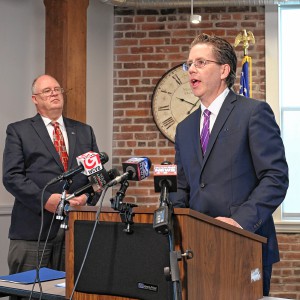 1989 homicide victim found in Warwick ID’d through genetic testing, but some mysteries remain
1989 homicide victim found in Warwick ID’d through genetic testing, but some mysteries remain
 Fogbuster Coffee Works, formerly Pierce Brothers, celebrating 30 years in business
Fogbuster Coffee Works, formerly Pierce Brothers, celebrating 30 years in business
 Greenfield homicide victim to be memorialized in Pittsfield
Greenfield homicide victim to be memorialized in Pittsfield
 Real Estate Transactions: May 3, 2024
Real Estate Transactions: May 3, 2024
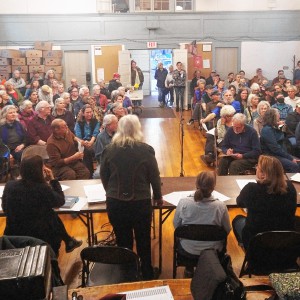 Battery storage bylaw passes in Wendell
Battery storage bylaw passes in Wendell
 As I See It: Between Israel and Palestine: Which side should we be on, and why?
As I See It: Between Israel and Palestine: Which side should we be on, and why?
We are now in the month of Elul on the Jewish calendar, the month preceding the Jewish New Year. Elul is a time of accounting and repentance, but it is also a time of recommitment and renewal. Elul is followed by Rosh Hashanah, the “Head of the Year,” which begins the 10 Days of Awe and culminates in Yom Kippur, the “Day of Atonement.”
Let’s talk about all of this.
Elul is a Hebrew acronym for a phrase from the Song of Songs, “I belong to my Beloved, and my Beloved to me.” It is in this month that G-d makes himself accessible to us, offering his vulnerability in exchange for ours. (I should note that G-d is everything that has ever existed and has both male and female attributes. The aspect of G-d that responds to prayer has traditionally been seen as male, so I use he/him in this piece.)
There is a mystical tradition that says that in the month of Elul, G-d leaves his palace, places his ministering angels on administrative leave, and resides in a field of wheat. From here he awaits our return to him, that we should acknowledge our mistakes and start over. How will we respond? Embarrassment? Shame? Procrastination perhaps, as we have another month or so to confess?
Rosh Hashanah is unique among the holidays in that it is not an exclusively Jewish holiday. This is because it marks the anniversary of G-d’s creation of Adam and Eve; the birthday of humankind. On this day and the day after, Jews wish one another a happy new year, as well as gentiles.
For these two and the following seven days, we have the opportunity to wipe the slate clean and start over. We are the closest to G-d during this time. This is a time of forgiveness, of repentance, and of spiritual renewal. We blow the shofar (ram’s horn instrument). We eat raisin bread. We stand by the river and cast off our sins. We make resolutions. My New Year’s resolution will be to switch to kosher meat without compromising my ethical standards.
The 10th day, Yom Kippur, is the spiritual climax of this period. This is our last chance to accept responsibility for our conduct before the Book of Life is sealed for the rest of the year. So just like any other deadline, we cram in as much repentance as we can. We fast. We extend the length of the prayer services to the point that they fill nearly every waking hour, add special portions for annulment of vows, and publicly confess to long lists of possible sins just to make sure we are covered. At the end of 25 hours, we transition from fast to feast with bagels and lox — because of course we do.
The rabbi in Amherst likes to say that the Day of Atonement is also the “Day of At-one-ment” because it is the closest we get to unification with the divine. May your month of Elul and Days of Awe be filled with closeness, hope and spiritual renewal. May you belong to your Beloved, and your Beloved to you. And may you be inscribed and sealed in the Book of Life for a good year.
Rosh Hashanah begins at sundown on Friday, Sept. 15.
Yom Kippur begins at sundown on Sunday, Sept. 24.
Jasper Lapienski is a congregant at the Chabad House at Amherst, Chabad-Lubavitch. He also serves as a city councilor for Greenfield.
ChaBaD is a Hebrew acronym for “wisdom, understanding and knowledge” and is a branch of Chasidic Judaism.
The Chabad House holds Shabbat services on Friday evenings when University of Massachusetts is in session, and every Saturday at 10:00 a.m., year-round, plus special services for Jewish holidays, at 30 North Hadley Road in Amherst.
Jasper hosts “Kabbalah & Chasidic Philosophy” at his home at 34 Washington St in Greenfield, Sundays at 7:00 p.m., taught by Rabbi Chaim Adelman of Amherst. Sunday classes will be suspended for the holidays. The last class will be Sept. 10 and they will resume on Oct 15.
For Sunday classes call 413-512-7651. For all other services visit www.chabadhouse atamherst.org or call 413-626-7820.

 Speaking of Nature: Indulging in eye candy: Finally, after such a long wait, it’s beginning to look like spring is here
Speaking of Nature: Indulging in eye candy: Finally, after such a long wait, it’s beginning to look like spring is here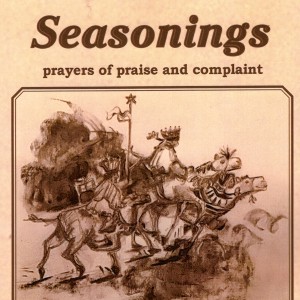 Celebrating ‘Seasonings’: New book by veteran preacher and poet, Allen ‘Mick’ Comstock
Celebrating ‘Seasonings’: New book by veteran preacher and poet, Allen ‘Mick’ Comstock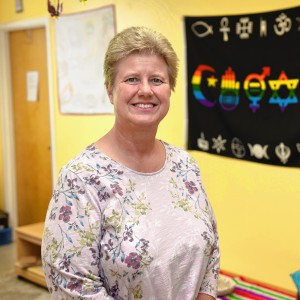 Faith Matters: How to still the muddy waters of overthinking: Clarity, peace and God can be found in the quiet spaces
Faith Matters: How to still the muddy waters of overthinking: Clarity, peace and God can be found in the quiet spaces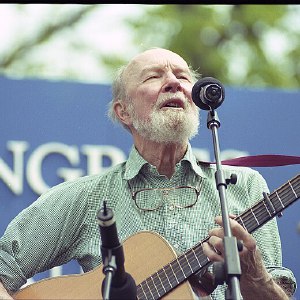 A time for every purpose under heaven: Free sing-a-long Pete Seeger Fest returns to Ashfield, April 6
A time for every purpose under heaven: Free sing-a-long Pete Seeger Fest returns to Ashfield, April 6
